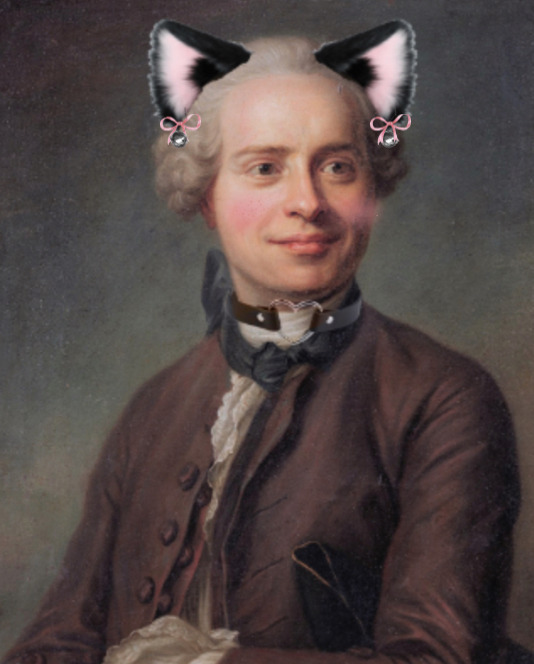#d'alembert
Text
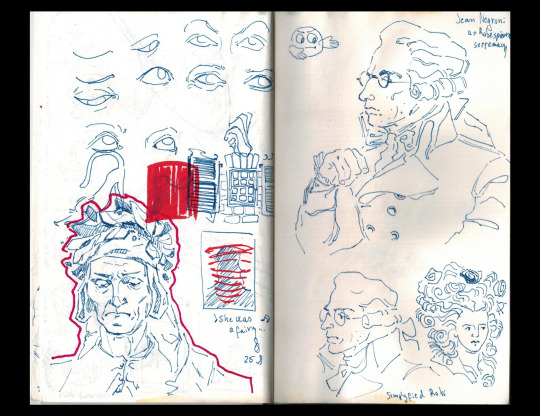





Sketches and charcoal drawings
Im now more focusing on my work for a bachelor degree (itll be a comic about Voltaire so i might post it here when its done)
#maximilien robespierre#frev#frev art#frev community#myart#dante alighieri#napoleon#napoleon bonaparte#marshall ney#michel ney#simo häyhä#18 century#19 century#rammstein#christoph schneider#napoleon 1927#napoleon fanart#d'alembert
280 notes
·
View notes
Text
Diderot, Rousseau, d'Alembert
Diderot, Rousseau, d'Alembert

Jean Baptiste Le Rond d'Alember, 16 novembre 1717, 29 ottobre 1783.

Denis Diderot, 5 ottobre 1713, 31 luglio 1784.



Enciclopedia. Illuminismo

Montesquieu, 18 gennaio 1689, 10 febbraio 1755.
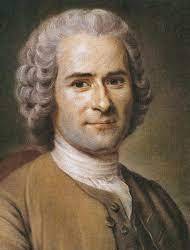
Jean-Jacques Rousseau, 18 giugno 1712, 2 luglio 1778.
Difficoltà insormontabili si oppongono alla lettura critica dell'intera Enciclopedia. Progressi sono stati compiuti dagli studiosi, anche coloro che la considerano, a loro modo, un classico sono consapevoli che i sessantamila articoli della compilazione, riguardanti ogni sorta di conoscenze e attività umane, non potranno mai essere oggetto di un'indagine filologica esaustiva. Un aiuto è venuto dall'uso di strumenti della ricerca informatizzata. La maggior tentazione consiste nel seguire le innumerevoli nervature dell'albero enciclopedico, alla ricerca di una chiave di lettura interna che consenta l'identificazione completa delle fonti, la ricostruzione dei nessi tra le singole voci e i loro autori, i confronti con la cultura contemporanea. L'opera di consultazione, composta com'è con materiali eterogenei e spesso di seconda mano, ha circolato ed eercitato storicamente la sua influenza in Europa e nle mondo sia nell'edizione princeps, sia in innumerevoli adattamenti e rielaborazioni.
La storia "politica" dell'Enciclopedia e i conflitti ideologici con cui essa dette luogo: "manifesti" introduttivi, come il Discorso preliminare di d'Alembert, il Prospectus di Diderot, la premessa ai volumi III e VIII.
La premessa del volume V, il grande Elogio di Montesquieu scritto da d'Alembert, le voci Enciclopedia e di Diderot, e Ginevra di d'Alembert, l'elogio di Montesquieu e l'annessa Analisi indicano anche un'altra delle direzioni nelle quali ci si è mossi: chi consideri l'utilizzazione che gli enciclopedisti fecero dell'Esprit des Lois in voci politiche, come Cristianesimo, Governo, le voci dedicate alle singole voci di governo; e le allusioni a Montesquieu nel Discorso preliminare e nella voce Eclettismo di Diderot, e infine l'articolo Gusto, la presenza nell'Enciclopedia di Montesquieu, fu fondamentale.
Jean-Jacques Rousseau è la terza grande figura dell'illuminismo francese che non poteva non essere rappresentata almeno con il suo contributo più importante: Economia politica. Questa voce, attraverso i rinvii alle altre voci politiche dei primi volumi, rileva implicanze non prive di interesse.
I due protagonisti dell'Enciclopedia, Diderot e d'Alembert. Il caso degli oltre cinquemila articoli o supplementi forniti da Diderot, è da tempo al centro della ricerca. L'edizione di John Laugh e Jacques Proust ha offerto un corpus attendibile di testi e documenti, fondato su un esauriente status quaestionis e sull'esame dei problemi di attribuzione irrisolti. Tra gli articoli politici attribuibili a Diderot, si sono inclusi Aius-Locutius, Autorità politica, Diritto naturale, Gesuita, che dettero origine a varie controversie. Tra gli articoli riguardanti la critica della religione o della superstizione: Bibbia, Casuista, Cerimonie, Credulità, che si sono inclusi. Altre voci Cristianesimo, Fanatismo di Deleyre, Tolleranza di Romilly, Ngombos e Preti di Holloch, tra le più vigorose rivendicazioni della libertà di coscienza nell'Enciclopedia, hanno il vantaggio di presentare il tema sotto angolature diverse.
L'archivio di Diderot include articoli che non sono opera sua, tra i quali Cartesiano e Newtonianismo, siglati da d'Alembert e Yvon, e dal solo d'Alembert, e la voce anonima Filosofo. La collaborazione di Diderot come autore di voci di storia della filosofia diventò assidua soltanto a partire dal volume quinto, con l'articolo Eclettis o, del quale si sono tradotte le pagine più personali. Le filosofie più affini alle dottrine correnti nei circoli illuministici: oltre a Eclettismo, si sono tradotte le voci Epicuireismo, Hobbismo, Locke, Macchiavellismo, Pirroniana o Scettica, Socratica. Questa scelta intende altresì documentare la tematica che Dideot trasse da Brucke e utilizzò negli altri scritti filosofici.
Si sono tradotte le voci di argomento estetico Bello e Genio. La voce Animale, serie di appunti quanto mai significativi presi in margine all'Histoire naturelle di Buffon del 1749; e inoltre Anima, Fortuito, Nascere, Niente, Spinozista, alcuni tra i più singolari esempi della tecnica con la quale Diderot andava inserendo idee materialistiche che non potevano essere esposte nelle voci principali. Questi testi giovano all'interpretazione del Reve de d'Alembert e degli Elemens de physiologie, e mostrano la continuità della riflessione filosofica diderotiana, degli scritti giovanili e quelli della maturità. Voce d'argomento morale come Deizioso, e una i critica sociale come Corte "campioni" di innumerevoli altre, dissimulate sotto pretesti lessicali o grammaticali. Gabinetto di storia naturale rinvia a temi analoghi presenti nell'Intérpretation de la nature. Jacques Proust ha fatto osservazioni pertinenti circa il lavoro effettivamente svolto in proposito da Diderot. La voce programmatica Arte, è la chiave del <<dizionario tecnico>>; insieme con talune pagine del Prospectus e della voce Enciclopedia essa offre, le considerazioni personali, teorie e pratiche, che Diderot fece in margine a quest'aspetto così essenziale dell'Enciclopedia.
D'Alembert. A parte il Discorso preliminare, l'Avvertenza al volume III, l'Elogio di Montesquieu, Ginevra, manca di un esame dei suoi contributi personali all'Enciclopedia. La sua sigla O contrassegna, le aggiunte agli articoli scientifici, una serie si articoli derivanti da scritti precedenti, oppure ripresi e sviluppati in lavori successivi, che tracciarono le linee dell'epistemologia e dell'ideologia enciclopedica. La connessione esistente tra il Discorso preliminare e gli articoli enciclopedici da un lato, gli Elémens de philosphie (1759), dall'altro. Le aggiunte all'articolo Attrazione, e le voci Elementi delle scienze e Sperimentale, confermano l'utilità di simili confronti per chi voglia comprendere l'originale elaborazione di idee epistemologiche, che dai lavori di meccanica e astronomia condusse d'Alembert, dove confluirono gran parte dei testi scientifici già scritti per l'Enciclopedia. Le voci Attrazione, Dinamica, Gravitazione, Newtonianismo presentano alcuni aspetti notevoli di d'Alembert fisico newtoniano. Altre voci curiose e notevoli - come Cortigiano, Copernico, Geometria, Fortuito - dimostrano la brillante versatilità del grande matematico, e la sua costante presenza a fianco di Diderot, talora con sottili antagonismi nell'affermazione delle idee forza dei lumi. La critica degli istituti educativi dell'ancien régime e la proposta di una nuova pedagogia, accolte in Sperimentale e nel più noto collegio.
#Annalisa Lanci#Montesquieu#Rousseau#d'Alembert#Francia#Parigi#Enciclopedia#storia#cultura#settecento#buio e luce#buio e luce tra cielo e terra#luce#tra cielo e terra
3 notes
·
View notes
Text
Friedrich to d'Alembert in 1765: The air quality in Berlin is great! Come stay with me! Please <3

d'Alembert, when he was leaving Berlin a few years ago: The air quality in Berlin is so bad I'm gonna die.

#history#friedrich der große#frederick the great#jean le rond d'alembert#the second letter was sent to his girlfriend in paris if anyone was wondering#the fact that i even made the connection says a lot about how my brain works#hehe funny 18th century guys
7 notes
·
View notes
Text
tagged by @elavoria for a wip extract... i'm back on my fountains of magic wip. kind of. mostly i'm just reading the bits i already have and not knowing where to go... this is a man of the enlightenment writing to his sister about magic
When our ancestors, unenlightened as they were, believed in spirits and fairies and Mother Nature herself, - o how we think them ignorant! Of course we do, - when though the rainbows in a shower of rain, or in the rising wake of a bird, leaving the water, are beautiful, they are inanimate, and may be drily explained and measured as things; and must not be given causes against the same science of their nature. O Philomena! I may not believe as they do, - I am not unreasoned, but I can understand the unreasonable, in the thraldom of such scenes, - not ignorance, but ecstasy!
#yorkshire girl writes#fountains is kind of sprung of diderot's reve de d'alembert but it's a poor and very different cousin...#my interpretation of the reve is a bit sideways of the point but i so love the depiction of a living materialism. atheism as unprosaic#anyway it's hard to describe in the tags where that fits in with the wip so i will not attempt it
4 notes
·
View notes
Note
I don't think I've ever been more motivated to self-help and go to therapy than after reading Confessions. It should just be an ad for therapy in general. Like "make sure you get help so you don't end up like this b*stard!"
Anon that is funny, but I'm so distracted by you censoring the word bastard like it's a slur only Hamilton and Robespierre can use or something
#and d'Alembert; the most well adjusted man of the 18th century#despite being abandoned at birth#Voltaire insists he can say it#ask#anon ask
10 notes
·
View notes
Text
yuumori hits different when u had a hyperfixation on the french revolution
#if the holmes family has to be the descendant of one of the frev leaders#it would be desmoulins#or even lavoisier bcs chemistry??#but it wouldnt be robespierre#william's background holds surprising similarities to d'alembert#yknow the mathematician who invented series and took part in the compilation of the encyclopedia#d'alembert is one of my historical favs so im happy abt that!
0 notes
Text


The new books I got yesterday look so cool. The firat one has a sort of wooden texture to the cover since it's all about stories set in forests, while the second has a hudden picture under the black and white cover.
18|11|2023
Today was quite prosuctive, I planned to do more in the afternoon, but I then had a friend call me while having an existential crisis, so I dedicated some time to him to at least try to calm him down a bit. It' scary how all of us somehow feel lost at the same time with the same struggles and het we are convinced we are the only ones to have those fears and thoughts. I plan on ending my day crocheting and then maybe reading a bit if I have enough energies for it.
cozy hobbit autumn activities and productivity:
read first thing in the morning
worked on a couple of recorded lectures
started reading one of the books I have to study for my philosophy class (I think I am more or less half way into it, in one more reading session I should be done with my first read)
continued my tma relistening
crocheted
daily Irish practice on duolingo
today's self care:
took my meds
switched my study enviroiment a bit, doing some reading around the house instead of sitting at my desk
📖: Odyssey by Homer, D'Alembert's Dream by Diderot
#studyblr#studyinspo#uniblr#university#student life#studying#student#book#book haul#journal#journaling#knife gang#notebook#productivity#cozy hobbit autumn#self care#mine#the---hermit
229 notes
·
View notes
Text
For heterosexual couples, procreation and, more specifically, motherhood represent the last realm where, even among progressives, the "Nature" argument, which we have learned to distrust in almost every other circumstance, still calls the shots. We know that, down the centuries, the most bizarre— and most oppressive —theories have been justified by the "obvious and unquestionable" proof apparently furnished by "Nature." For example, in 1879, Gustave Le Bon confirmed that "The brains of many women are closer in size to those of gorillas than to the more developed brains of men. This inferiority is so evident that no one could gainsay it for a moment: only the degree of difference is worth any discussion." With time, the absurdity of this kind of thinking has become abundantly clear. These days, we avoid attributing any particular disposition or specific behavior to any physical feature. In progressive circles, for example, no one will tell gay and lesbian people that their sexual practices are problematic, that they are attracted to the wrong people and that their organs haven't been designed for use in this way; no one would ever venture: "Excuse me, but did you misread the manual? Nature actually says . . . ." And yet, as soon as were on the topic of women and babies, it's a free-for-all: the result is a carnival of biological Freudian banana skins, if I may put it this way. Suddenly you find yourself surrounded by fervent advocates of the very narrowest biological determinism.
They have a uterus: this is the truly irrefutable proof that women ought to have children, right? We appear not to have advanced an inch since the eighteenth century, when the entry for "Femme" ("Woman") in Diderot and d'Alembert's Encyclopedia comprised a description of a woman's physical appearance and the conclusion that "all these facts demonstrate that the purpose of women is to have children and to feed them." We continue to believe unshakeably that women are programmed to want to be mothers. In earlier times, this was put down to the independent volition of their uterus, a "formidable animal," "possessed with the desire to create children," "lively, resistant to reason, working in the interests of fearsome desires to dominate over all." The self-motivating womb has now relinquished its place in the collective imagination to that mysterious organ known as the "biological clock," which no X-ray has yet managed to locate, yet whose relentless ticking is easily detected by putting your ear to the belly of any woman between thirty-five and forty. "We are used to thinking about metaphors like 'the biological clock' as if they were not metaphors at all, but simply neutral descriptions of facts about the human body," observes essayist Moira Weigel. The term "biological clock" was first used to refer to women's fertility in 1978, in a Washington Post article titled "The Clock is Ticking for the Career Woman." In other words, this expression was an early harbinger of the imminent anti-feminist backlash, and its dazzlingly successful integration into the female anatomy makes it a unique phenomenon in the history of evolution—it would have given Darwin pause for thought. Since women's bodies give them the option of carrying a child, of course Nature would prefer that women also change the resulting infant's nappies, once born, that they attend all meetings with pediatricians and, while we're on the subject, that they mop the kitchen floor, do the washing-up and remember to buy loo roll for the next twenty-five years. This is known as "maternal instinct." Yes, Nature orders precisely this, and not, for example, that, in order to thank women for taking on the major task required for perpetuation of the species, society do its best to compensate them for the inconveniences they thereby suffer; nothing of the sort. If you thought that might make sense, you haven't really understood Nature.
-Mona Chollet, In Defense of Witches: The Legacy of the Witch Hunts and Why Women are Still on Trial
33 notes
·
View notes
Text
🌱Émilie du Châtelet🌱
Gabrielle Émilie Le Tonnelier de Breteuil, Marquise du Châtelet was a French natural philosopher and mathematician in the early 1700s
Her most recognized achievement is her translation of and commentary on Isaac Newton's 1687 book Philosophiæ Naturalis Principia Mathematica containing basic laws of physics. The translation, published in 1756, is still considered the standard French translation.
Her commentary includes a contribution to Newtonian mechanics. This led her to conceptualize energy, and to derive its quantitative relationships to the mass and velocity of an object.
Her philosophical magnum opus, Institutions de Physique, circulated widely, generated heated debates, and was republished and translated into several other languages within two years of its original publication.
She also participated in the famous vis viva debate, concerning the best way to measure the force of a body and the best means of thinking about conservation principles. Her ideas were heavily represented in the most famous text of the French Enlightenment, the Encyclopédie of Denis Diderot and Jean le Rond d'Alembert, first published shortly after du Châtelet's death.
(Old post)
14 notes
·
View notes
Text
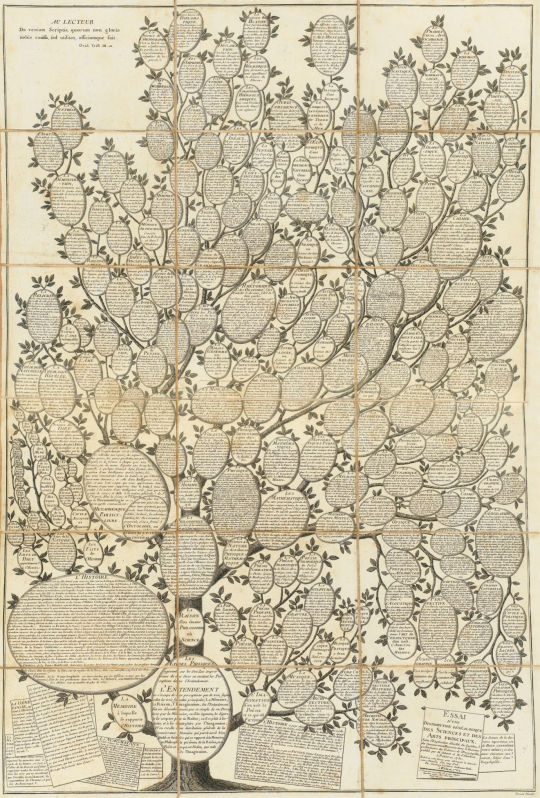
Essai d'une distribution généalogique des sciences et des arts principaux. Selon l'explication détaillée du système des connaissances humaines dans le discours préliminaire des éditeurs de l'Encyclopédie publiée par M. Diderot et M. d'Alembert, à Paris en 1751. Réduit en cette forme pour découvrir la connaissance humaine d'un coup d'oeil par Chrétien Frederic, Guillaume Roth, à Weimar, 1769
22 notes
·
View notes
Text


obsessed with the implications of this
2 notes
·
View notes
Text
#Illuminismo#Diderot#Rousseau#d'Alembert#filosofia#storia#ultura#buio e luce#buio e luce tra cielo e terra#tra cielo e terra
0 notes
Text
【文具今昔】漫畫中的羽毛筆與寫字檯

▲不少轉生、惡千金題材的漫畫很多是參考中世紀或文藝復興時期為背景,每次看到有漫畫家把寫字檯畫出來,我就會在心裡拍手:「有做功課!」「有認真!」
▼現今寫字檯不是必要的工具,但在羽毛筆流行的年代卻是專業的抄寫員(一般是僧侶)必備的東西,利用寫字檯的斜度調節墨的流量。
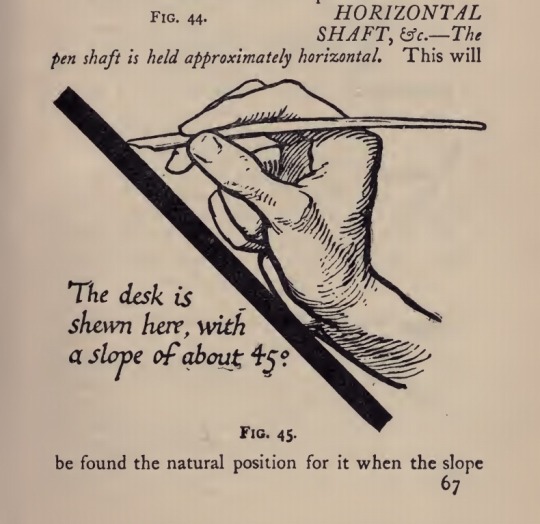
▼這幅十五世紀的插圖是描寫一位名叫讓•梅洛的抄寫吏的辦公室,他不是左右開弓,他是一手拿著羽毛筆,一手拿著刀子。

真正的羽毛筆是把毛剃掉只用羽管削成沾水筆使用,所以圖中的羽毛筆是白白一根而不是一根完整的羽毛。 而當時抄寫多使用羊皮紙,紙張比較厚實堅韌,寫錯字直接用刀片刮除錯字即可,所以此時關於抄寫吏的圖畫大多是像這樣左右手都拿著工具的雙刀俠。

▲補充一下,17世紀的點尖字體(如銅版體),因為線條較細,較沒有控墨的必要,所以這時期就不一定會用到寫字檯了。
▼下圖是喬治.畢格漢 (1684–1758) 的銅版體,此時的點尖字體還有很多種,就不展開來講了。

▼關於寫字檯的部分我就不展開講了,之前有寫過一篇:
https://watering76.tumblr.com/post/693980075264180224/
資料來��:
剩餘一天折斷所有破滅flag (残り一日で破滅フラグ全部へし折ります),原作福留しゅん,作畫天城望。
Edward Johnston,Writing & Illuminating, & Lettering,1906
L'Encyclopédie Diderot et d'Alembert L'art de l'écriture
wikipedia, Bickham-letter-detail
10 notes
·
View notes
Text
When I finally get free time to make threads about my specialized area of historical studies it's all over for you all I will not shut up
#the specialized areas in question is just the french enlightenment#especially the encyclopedists#and very especially the two main ones diderot and d'alembert#i know more about these guys than i do about myself#i just haven't got to arranging the facts i know into threads yet#just you wait
2 notes
·
View notes
Note
...just got a hold of the only English translation I could find of Heissenbuttel's texts - poetry. Wish to someday find an English translation of his d'Alembert book you have.
If i ever finish the translation of the text i will let you know. I have a first draft but it requires a great deal of work and rework.
3 notes
·
View notes
